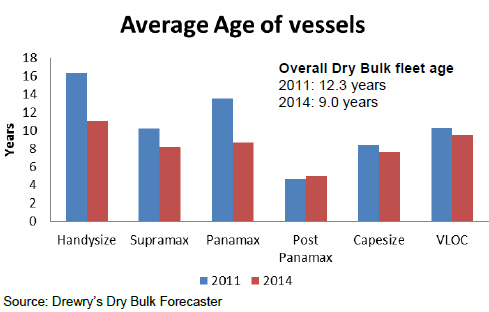Dry Bulk Shipping to Recover in Late 2015
Strong trade growth, moderating fleet development and deployment of new fuel efficient vessels are expected to lead to a recovery in dry bulk shipping rates later in 2015, according to the latest edition of the Dry Bulk Forecaster, published by global shipping consultancy Drewry.
“We expect rates to remain under pressure through the first quarter of 2015,” said Rahul Sharan, Drewry’s dry bulk shipping lead analyst. “However, thereafter earnings will recover as modern fuel efficient ships gain employment at higher rates relative to older ships. This is one of the reasons why average charter rates recovered in 2014 compared to 2013, despite continuing capacity pressure.”

Modern vessels command higher rates due to their superior fuel efficiency and environmental credentials, relative to older units. Drewry estimates that since 2011 the average age of the dry bulk fleet has declined from 12 to 9 years (see above graph) which is one of several factors that has helped to support charter rates in an otherwise weak market.
Drewry estimates that the dry bulk shipping trade increased 8.3% in 2014, supported by strong iron ore demand and a 20% leap in grain trade. New vessel deliveries declined in 2014 as owners deferred orders in light of a weak market which limited 2014 fleet growth to 5.3% compared with 6.2% in 2013. Future capacity additions to the dry bulk fleet are likely to be checked by the conversion of some existing dry bulk orders to tankers, and continued slippage with new deliveries.
“We expect to see some acceleration in 2015 deliveries despite a moderating orderbook, thanks largely to increased slippage from 2014,” added Sharan. “However, despite the uncertainty surrounding the global economy, we anticipate that 2015 will be another year in which dry bulk demand outpaces supply. This more favourable capacity outlook coupled with the influx of modern fuel efficient ships points to a recovery in the dry bulk shipping market in the second half of 2015.”
HEADLINES
- Do shipping markets want Biden or Trump for the win?
- All 18 crew safe after fire on Japanese-owned tanker off Singapore
- Singapore launching $44m co-investment initiative for maritime tech start-ups
- Cosco debuts Global Shipping Industry Chain Cooperation Initiative
- US warns of more shipping sanctions
- China continues seaport consolidation as Dalian offer goes unconditional